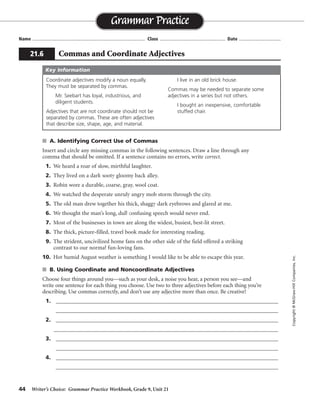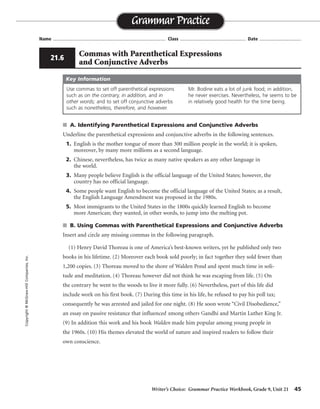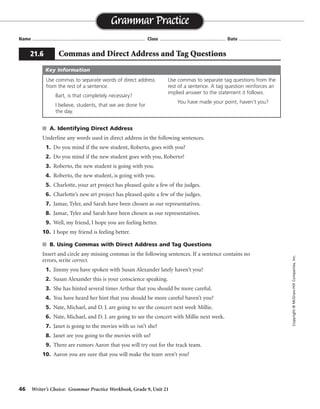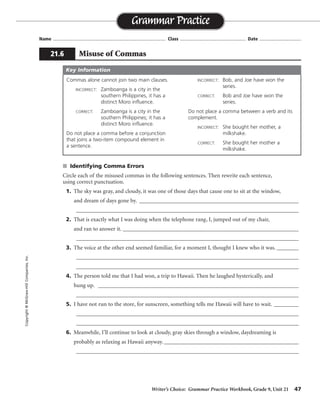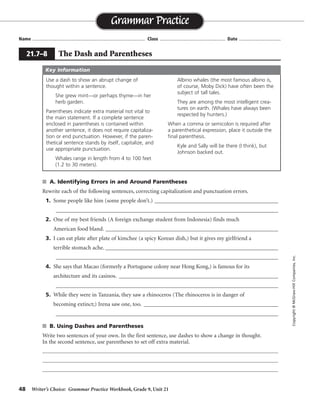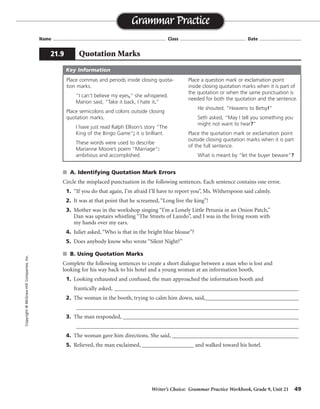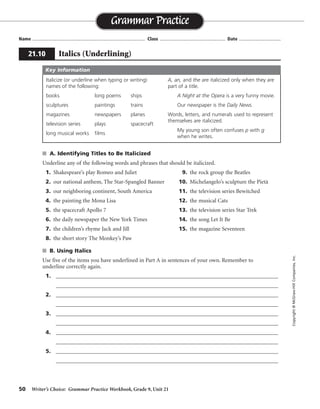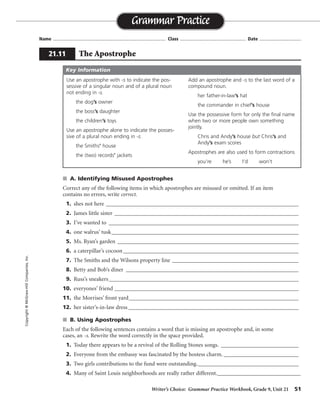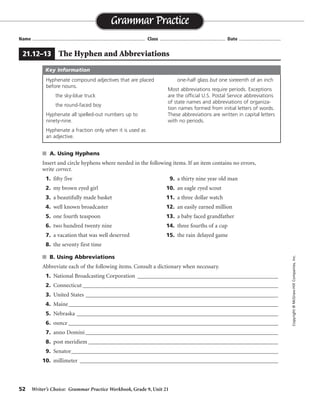This document appears to be from a grammar practice workbook for grade 9 published by McGraw-Hill. It contains the table of contents which lists chapters on parts of speech, parts of the sentence, phrases, clauses and sentence structure, verb tenses and voice, subject-verb agreement, pronouns, modifiers, capitalization, and punctuation. The document provides examples and explanations of key grammar concepts. It also includes practice exercises labeling parts of speech, identifying pronouns, and combining sentences using relative pronouns. The purpose is to help students learn and practice important grammar rules and skills.
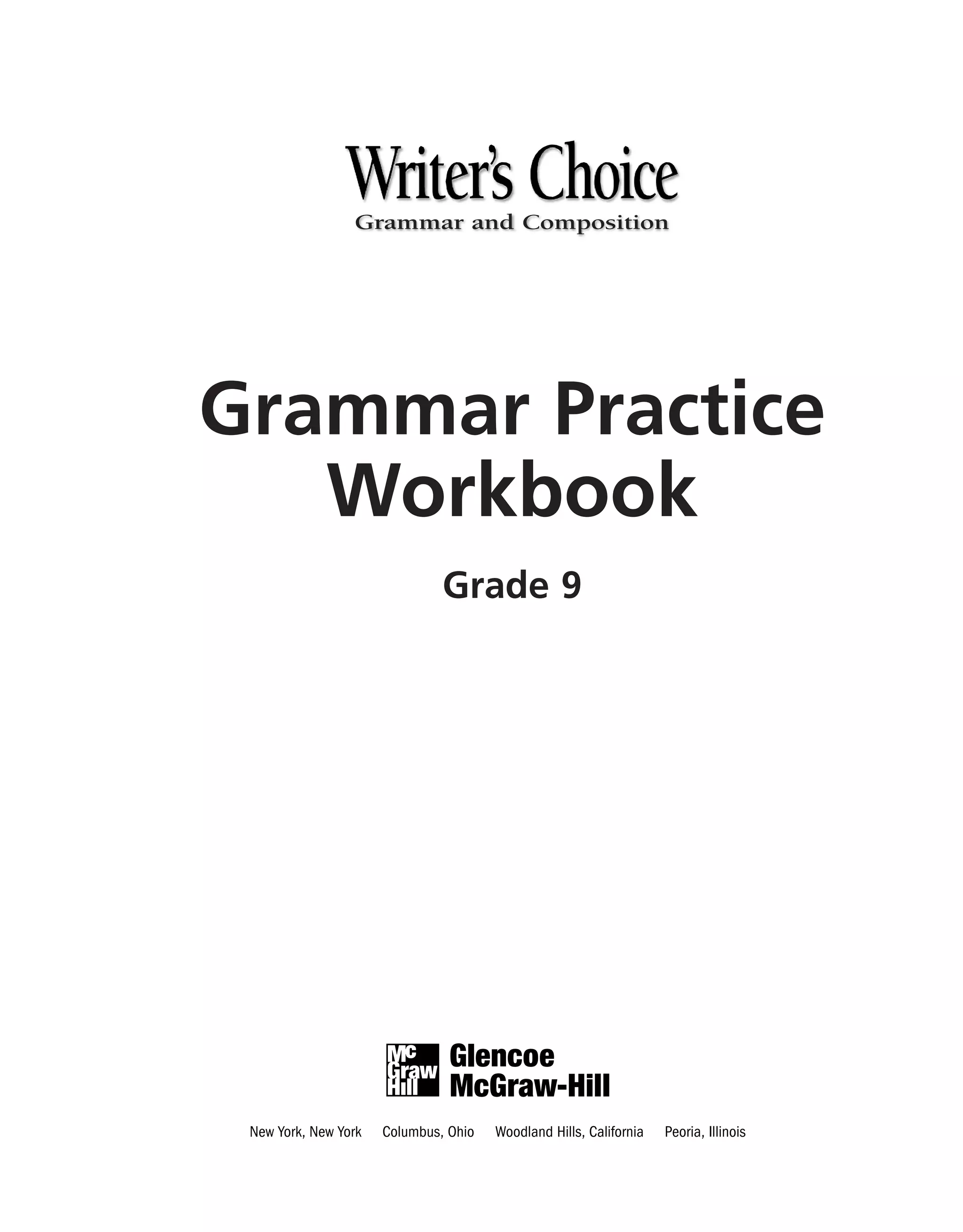
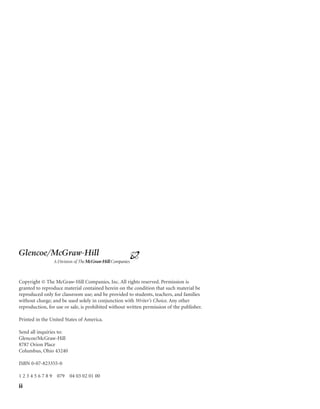
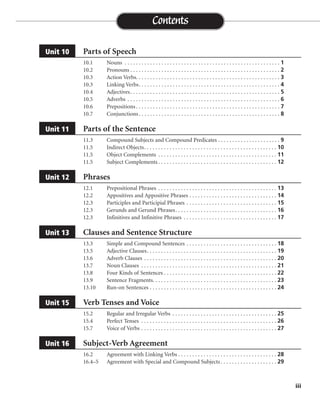
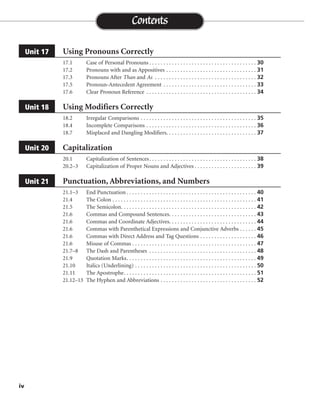
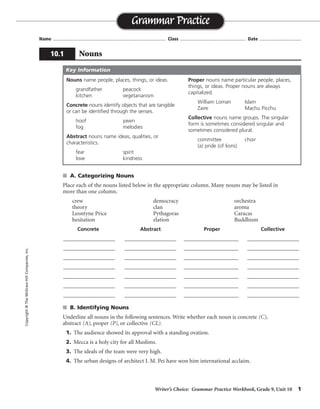
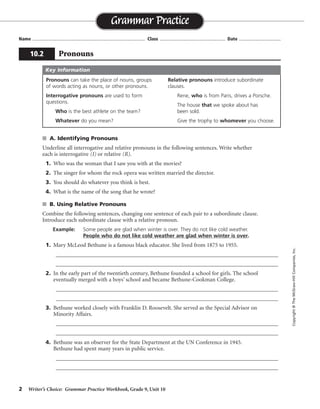
![Writer’s Choice: Grammar Practice Workbook, Grade 9, Unit 10 3
Name ...................................................................................... Class .................................................. Date ................................
s A. Identifying Transitive and Intransitive Verbs
The following excerpt is from The Waves, a novel by British writer Virginia Woolf. Write
whether each of the boldface action verbs in the excerpt is transitive (T) or intransitive (I). If
the verb is transitive, underline the word or words following it that answer the question what?
or whom?
s B. Using Transitive and Intransitive Verbs
Write five sentences about yourself. Identify each action verb you use as transitive (T)
or intransitive (I).
1. ______________________________________________________________________________
2. ______________________________________________________________________________
3. ______________________________________________________________________________
4. ______________________________________________________________________________
5. ______________________________________________________________________________
Grammar Practice
10.3 Action Verbs
Copyright©TheMcGraw-HillCompanies,Inc.
Action verbs describe physical or mental action.
jog think
smile worry
point
Transitive verbs are action verbs followed by
words that answer what? or whom?
Jack made his own wedding cake. [The
words wedding cake follow the transitive
verb made and answer the question
made what?]
Intransitive verbs are also action verbs, but
they are not followed by words that answer
what? or whom?
Condors live in the Andes. [The intransitive
verb live is followed by the words in the
Andes, which tell where, not what or
whom.]
Key Information
T
he light struck upon the trees in the garden, making one leaf transparent and then another. One
bird chirped high up; there was a pause; another chirped lower down. The sun sharpened the
walls of the house, and rested like the tip of a fan upon a white blind and made a blue fingerprint of
shadow under the leaf by the bedroom window. The blind stirred slightly, but all within was dim
and unsubstantial. The birds sang their blank melody outside. . . .
The waves broke and spread their waters swiftly over the shore. One after another they massed
themselves and fell; the spray tossed itself back with the energy of their fall.
Virginia Woolf, The Waves
Literature Model
I
I
I
T
T
I
T
T T T
TI
Sentences will vary.](https://image.slidesharecdn.com/wbgrammar9-200715232228/85/MODULE-ENGLISH-9-7-320.jpg)
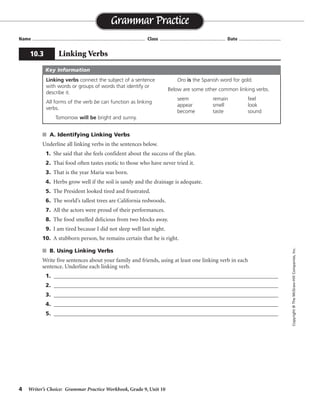
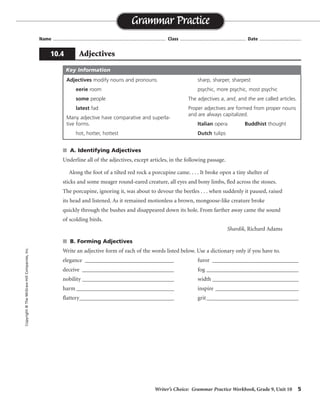
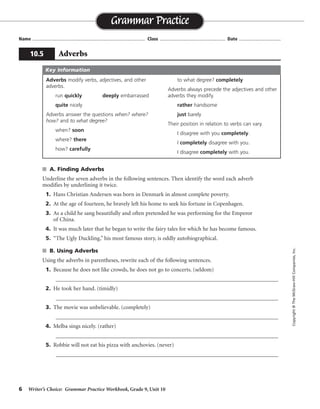
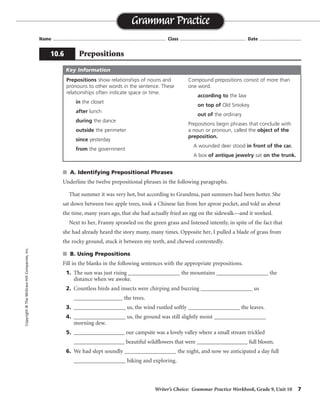
![8 Writer’s Choice: Grammar Practice Workbook, Grade 9, Unit 10
s A. Identifying Subordinating Conjunctions
In the following sentences circle the subordinating conjunctions.
1. Please turn off the oven before you go out.
2. Whenever she tried to call her office, the line was busy.
3. In order that we understand each other perfectly, I have asked a translator to be present.
4. Angler fish move very slowly unless they are eating.
5. Although the country has been called Thailand for many years, some people still refer to it
by its old name, Siam.
s B. Using Subordinating Conjunctions
Using the subordinating conjunctions provided in parentheses, combine each pair of sentences
below so that the first sentence becomes grammatically dependent upon the second.
1. It had rained so heavily. We postponed the car wash. (because)
_________________________________________________________________________________
2. I was stepping out of the shower. The telephone rang. (while)
_________________________________________________________________________________
3. Miriam thought about it for a few minutes. She apologized. (after)
_________________________________________________________________________________
4. He did not prepare well. Frank did very well on the SAT. (considering that)
_________________________________________________________________________________
5. Beethoven had gone deaf. He still composed beautiful music. (even though)
_________________________________________________________________________________
Name ...................................................................................... Class .................................................. Date ................................
Grammar Practice
10.7 Conjunctions
Copyright©TheMcGraw-HillCompanies,Inc.
Subordinating conjunctions join two clauses
so that one clause depends grammatically upon
the other.
The clause introduced by the subordinating
conjunction is called a dependent clause.
It cannot stand alone as a sentence.
As far as I am concerned, you have
the job. [As far as is the subordinating
conjunction. As far as I am concerned
is a dependent clause.]
She did not marry him although she loved
him. [Although is the subordinating con-
junction. Although she loved him is a
dependent clause.]
Other common subordinating conjunctions
include the following:
before while
unless in order that
until since
because as soon as
Key Information
Because it . . . heavily, we. . . .
While I was . . . , the telephone. . . .
After Miriam . . . , she apologized.
Considering that he did . . . , Frank did. . . .
Even though Beethoven had gone deaf, he still. . . .](https://image.slidesharecdn.com/wbgrammar9-200715232228/85/MODULE-ENGLISH-9-12-320.jpg)
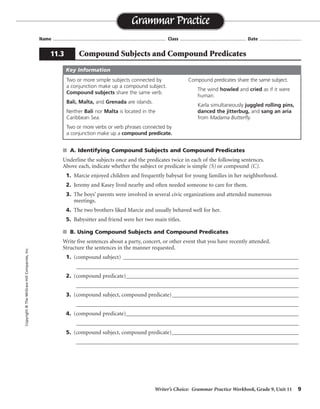
![10 Writer’s Choice: Grammar Practice Workbook, Grade 9, Unit 11
s A. Identifying Indirect Objects
Underline the indirect objects in the following sentences. Write IO above each indirect object.
1. Carmella bought her little brother the Samoyed puppy he wanted so badly.
2. Could you lend me your math book until next Tuesday?
3. He brought the team genuine grass skirts and two bushels of fresh pineapples.
4. Miss Bunger said she didn’t tell Jackie your secret.
5. Jesse showed the doctor the unusual scar.
s B. Using Indirect Objects
Using the nouns or pronouns in parentheses, rewrite each sentence so that it contains an indi-
rect object. (Remember to place the indirect object between the verb and the direct object.)
1. Ralph saved a ticket. (Pamela)
_________________________________________________________________________________
_________________________________________________________________________________
2. Dr. Prankas offered his professional opinion. (Michelle)
_________________________________________________________________________________
_________________________________________________________________________________
3. Chris made his special meatless chili. (Kevin)
_________________________________________________________________________________
_________________________________________________________________________________
4. The stand-up comedian promised an encore. (his fans)
_________________________________________________________________________________
_________________________________________________________________________________
Name ...................................................................................... Class .................................................. Date ................................
Grammar Practice
11.5 Indirect Objects
Copyright©TheMcGraw-HillCompanies,Inc.
Complements are words or groups of words
that make the meaning of a verb complete.
Indirect objects are complements that answer
the question for what? to what? for whom? or
to whom? after an action verb.
Bill baked Marla a birthday cake. [for
whom did Bill bake?]
Porter gave the homeless man his last
dollar. [To whom did Porter give his dollar?]
Juditha mailed the recruiting office her
completed application. [To whom did
Juditha mail the application?]
Only sentences with direct objects can have
indirect objects.
Key Information
IO
IO
IO
IO
IO
Ralph saved Pamela a ticket.
Dr. Prankas offered Michelle his professional opinion.
Chris made Kevin his special meatless chili.
The stand-up comedian promised his fans an encore.](https://image.slidesharecdn.com/wbgrammar9-200715232228/85/MODULE-ENGLISH-9-14-320.jpg)
![Writer’s Choice: Grammar Practice Workbook, Grade 9, Unit 11 11
Name ...................................................................................... Class .................................................. Date ................................
s A. Identifying Object Complements
Underline the object complements in the following sentences and indicate whether each is an
adjective (ADJ), a noun (N), or a pronoun (PRO).
1. Most gardeners consider dandelions ugly and offensive.
2. In a moment of madness, he declared his dead father king.
3. Bonnie thought the mistake hers, but it wasn’t.
4. Do you consider Ohio the Midwest or the East?
5. He called the project foolish and slammed the receiver down.
s B. Using Object Complements
Using any of the verbs listed below, write five sentences about your ideal pet, whether real or
imagined. Include an object complement in each sentence.
make consider call think appoint
name declare elect choose find
1. ______________________________________________________________________________
_________________________________________________________________________________
2. ______________________________________________________________________________
_________________________________________________________________________________
3. ______________________________________________________________________________
_________________________________________________________________________________
4. ______________________________________________________________________________
_________________________________________________________________________________
5. ______________________________________________________________________________
_________________________________________________________________________________
Grammar Practice
11.5 Object Complements
Copyright©TheMcGraw-HillCompanies,Inc.
An object complement follows a direct object
and describes or identifies it by answering the
question what? Object complements can be
adjectives, nouns, or pronouns.
He thought the trial useless. [adjective]
They named her Queen for a day. [noun]
Consider the job yours. [pronoun]
Object complements often are used with the
following verbs:
think call find appoint
elect make name choose
Key Information
Sentences will vary.
ADJADJ
N
PRO
NN
ADJ](https://image.slidesharecdn.com/wbgrammar9-200715232228/85/MODULE-ENGLISH-9-15-320.jpg)
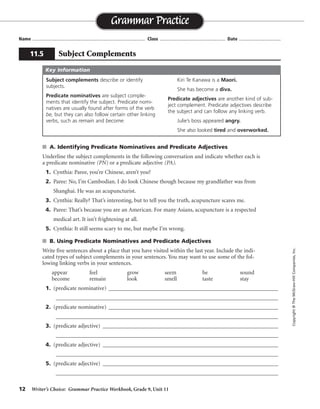
![Writer’s Choice: Grammar Practice Workbook, Grade 9, Unit 12 13
Name ...................................................................................... Class .................................................. Date ................................
s A. Identifying Prepositional Phrases
Circle the prepositional phrases in the following titles of poems by African poets.
“The Fate of Vultures” “To Abuenameh at Four”
“Elegy for Oduduwa” “There Was Thunder Without Rain”
“Waiting for Others” “Nursery Rhyme After a War”
“To the Wielders of Flags” “Sunset Over Mparayi”
“By the Long Road” “Law of the Jungle”
s B. Using Prepositional Phrases
Rewrite the sentences below. Make the word in parentheses the object of a prepositional
phrase and insert the phrase into the sentence. Then write whether the phrase is working
as an adjective or adverb.
1. The flowers were delivered yesterday afternoon. (wedding) _______________________________
_________________________________________________________________________________
2. Alfredo continued to breathe roughly, but he seemed better the next morning. (day) __________
_________________________________________________________________________________
3. The telephone rang seven times. (breakfast)___________________________________________
_________________________________________________________________________________
4. Although the contestant fidgeted nervously, he was calm when his turn came to answer
the question. (soundproof booth) ____________________________________________________
_________________________________________________________________________________
5. The engagement ring was the most expensive one available. (showcase)_____________________
_________________________________________________________________________________
Grammar Practice
12.1 Prepositional Phrases
Copyright©TheMcGraw-HillCompanies,Inc.
A group of words that begins with a preposition
and ends with a noun or pronoun is called a
prepositional phrase. The noun or pronoun
that follows the preposition is called the object
of the preposition.
They began their project with good
intentions. [Intentions is the object of
the preposition with.]
Prepositional phrases can act as adjectives.
Have you ever had a room with a view?
[With a view modifies the noun room.]
They can also act as adverbs.
At noon they met in secret. [At noon
and in secret modify the verb met.]
Key Information
The flowers for the wedding. . . . adjective
. . . breathe roughly during the day. . . . adverb
. . . rang seven times before breakfast. adverb
Although the contestant in the soundproof booth. . . . adjective
The engagement ring in the showcase. . . . adjective](https://image.slidesharecdn.com/wbgrammar9-200715232228/85/MODULE-ENGLISH-9-17-320.jpg)
![14 Writer’s Choice: Grammar Practice Workbook, Grade 9, Unit 12
s A. Identifying Appositives and Appositive Phrases
Underline the appositives and appositive phrases in the following sentences.
1. Meredith decided to major in herpetology, the study of amphibians and reptiles.
2. The San Andreas fault, a fracture in the earth’s crust, is the focus of intense geologic study.
3. The policy was begun by Jimmy Carter, the thirty-ninth president of the United States.
4. The movie Chariots of Fire is still one of my favorites.
5. Jay’s friend Charles wants to train to be a pilot.
6. Shakespeare’s play A Midsummer Night’s Dream is one of the most recent to be made
into a film.
s B. Using Appositives and Appositive Phrases
Rewrite each of the following sentences, adding an appositive or appositive phrase. Use com-
mas where necessary.
1. Chicago can be overwhelming if you are uncomfortable in large metropolitan areas.
_________________________________________________________________________________
_________________________________________________________________________________
2. Stephen likes to ride horses when he visits his grandparents’ farm.
_________________________________________________________________________________
_________________________________________________________________________________
3. His sister won the best actress award.
_________________________________________________________________________________
_________________________________________________________________________________
4. Many people do not realize that Panama is in the same time zone as New York City.
_________________________________________________________________________________
_________________________________________________________________________________
Name ...................................................................................... Class .................................................. Date ................................
Grammar Practice
12.2 Appositives and Appositive Phrases
Copyright©TheMcGraw-HillCompanies,Inc.
Appositives are placed next to other nouns
and pronouns and give extra or identifying
information about them.
My dog, Ariel, is an Australian shepherd.
Appositives of more than one word are called
appositive phrases.
His fiancee, a civil engineer, was
transferred.
An appositive should be set off with commas
unless it is necessary to the meaning of the sen-
tence.
Toni Morrison’s novel The Bluest Eye has
been the topic of such serious discussion.
[Since Morrison has written more than one
novel, the appositive is necessary to the
meaning of the sentence.]
Key Information
Sentences may vary.](https://image.slidesharecdn.com/wbgrammar9-200715232228/85/MODULE-ENGLISH-9-18-320.jpg)
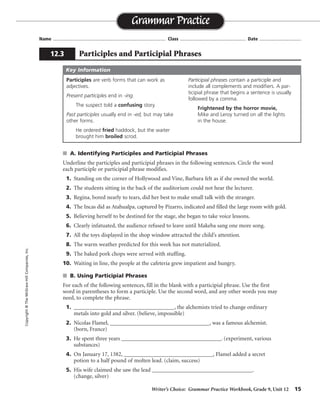
![16 Writer’s Choice: Grammar Practice Workbook, Grade 9, Unit 12
s A. Identifying Gerunds and Gerund Phrases
Underline the gerunds and gerund phrases in the following sentences. Cross out the participles
and participial phrases.
1. Watching the diver perform, Susan made up her mind to practice harder.
2. Watching television has become a national pastime.
3. He had a bad case of insomnia from watching the news.
4. Martha, singing like a professional, stole the show.
5. She said the thing she likes least about her new boyfriend is his singing.
6. Collecting stamps is a popular hobby.
7. By working together, the man’s sons repaired his damaged roof in two days.
8. Exercising regularly, Linda had more energy than most of the people around her.
9. The student council position will involve assuming a great deal of responsibility.
10. Exhausted, Ben finally finished writing his paper for history class.
s B. Using Gerunds and Gerund Phrases
Rewrite the following sentences by replacing the italicized words with gerunds or gerund phrases.
1. To believe that story is to believe in Santa Claus.
_________________________________________________________________________________
2. To get there before dinner is easy for him.
_________________________________________________________________________________
3. Marissa said that she really likes to read and to write.
_________________________________________________________________________________
4. To smoke is not permitted here.
_________________________________________________________________________________
5. I could not bear to tell him the bad news.
_________________________________________________________________________________
Name ...................................................................................... Class .................................................. Date ................................
Grammar Practice
12.3 Gerunds and Gerund Phrases
Copyright©TheMcGraw-HillCompanies,Inc.
Like present participles, gerunds are verb forms
that end in -ing. Unlike participles, however,
gerunds act as nouns.
Thinking hard, he discovered the answer.
[Thinking is a participle that modifies the
pronoun he.]
Thinking gives him a headache. [Here,
Thinking is a gerund that functions as
the subject of the sentence.]
A gerund phrase includes a gerund and any
complements and modifiers.
Thinking like a criminal is part of every
detective’s job.
Key Information
Believing, believing
Getting
reading, writing
Smoking
telling](https://image.slidesharecdn.com/wbgrammar9-200715232228/85/MODULE-ENGLISH-9-20-320.jpg)
![Writer’s Choice: Grammar Practice Workbook, Grade 9, Unit 12 17
Name ...................................................................................... Class .................................................. Date ................................
s A. Identifying Infinitives and Infinitive Phrases
Underline the infinitives and infinitive phrases in the following sentences.
1. To get to the village, first you have to take a ferry and then you have to take a taxi.
2. Is it really better to look before you leap?
3. She wanted to try out for the basketball team, but she learned that in order to do that she
had to have a B average.
4. They had initially decided to go mountain climbing but feared they were too out of shape
to try it.
5. They have always wanted to go to India to see if they could find their relatives.
6. Here the writer tried to develop an unusual image in the reader’s mind.
7. When Laticia was late, her friends decided to leave without her.
8. To win the prize will require extraordinary effort.
9. When they travel, his parents like to visit historical places.
10. If you do not want to drive in the city, you will need to take the bus.
s B. Using Infinitives
Rewrite the following sentences by changing the underlined words or phrases to infinitives.
1. Getting there by car is almost impossible.
_________________________________________________________________________________
2. My aunt Mattie really likes swimming in the Atlantic in December.
_________________________________________________________________________________
3. Listening well is a skill worth cultivating.
_________________________________________________________________________________
4. I have decided that approaching him is more trouble than it is worth.
_________________________________________________________________________________
5. Florence began taking lessons at the age of five.
_________________________________________________________________________________
Grammar Practice
12.3 Infinitives and Infinitive Phrases
Copyright©TheMcGraw-HillCompanies,Inc.
Infinitives are base forms of verbs preceded by
the word to. Infinitives can be used as nouns,
adjectives, or adverbs.
To smoke is prohibited. [The infinitive to
smoke is used as a subject.]
Raphael loves to cook. [The infinitive to
cook is used as a direct object.]
He had a longing to escape. [The infinitive
to escape is used as an adjective.]
He was too angry to talk. [The infinitive
to talk is used as an adverb.]
Infinitive phrases include an infinitive plus all
modifiers and complements.
It is easiest to get there by plane.
Key Information
To get
to swim
To listen
to approach
to take](https://image.slidesharecdn.com/wbgrammar9-200715232228/85/MODULE-ENGLISH-9-21-320.jpg)
![18 Writer’s Choice: Grammar Practice Workbook, Grade 9, Unit 13
s A. Identifying Simple and Compound Sentences
Write whether each of the following sentences is simple or compound.
1. Our cousins have moved to Quebec, and we may visit them soon.
2. Sandra and all the other girls simply could not believe the seasoned newscaster’s methods
of gathering and synthesizing information.
3. Bell bottoms were once the latest fad; now they seem comically old-fashioned.
4. There was something vaguely mysterious about his odd European mannerisms, yet both
my gangly older brother and I were grateful for his advice.
5. Ted had hoped to spend the summer as a swimming instructor, but he was unable to pass
the Red Cross test.
6. After hours of investigation, the detectives still had not discovered a single clue.
7. The students considered the problem but were unable to agree on a solution.
8. This recipe sounded good, but the casserole tastes terrible.
s B. Using Simple and Compound Sentences
Combine each of the following groups of simple sentences to form compound sentences.
1. The movie was supposed to be good. I still didn’t want to go. _____________________________
_________________________________________________________________________________
2. Charles bought the Thanksgiving turkey. Jefferson cooked it. Maria, Elaine, and Rebecca
ate it. ____________________________________________________________________________
_________________________________________________________________________________
3. Study anthropology. Study art. You can’t do both. ______________________________________
_________________________________________________________________________________
4. The little dog laughed to see such a sport. The dish ran away with the spoon. ________________
_________________________________________________________________________________
Name ...................................................................................... Class .................................................. Date ................................
Grammar Practice
13.3 Simple and Compound Sentences
Copyright©TheMcGraw-HillCompanies,Inc.
A simple sentence has one main clause.
The dog bit the trainer.
The dog and the cat bit the trainer. [simple
sentence with compound subject.]
The dog bit and scratched the trainer. [sim-
ple sentence with compound predicate]
The mangy dog and the scruffy, yowling
cat viciously bit and scratched the cruel,
underpaid trainer. [expanded simple sen-
tence with compound subject, compound
predicate, and modifiers.]
A compound sentence has two or more main
clauses joined by a coordinating conjunction or
a semicolon.
The dog bit, and the cat scratched.
The dog bit; the cat scratched.
Key Information
compound
simple
compound
compound
compound
simple
simple
compound
. . . be good, but I still . . .
. . . turkey, and Jefferson cooked it; Maria, Elaine. . . .
Study anthropology or art; you can’t do both.
. . . sport, and. . . .](https://image.slidesharecdn.com/wbgrammar9-200715232228/85/MODULE-ENGLISH-9-22-320.jpg)
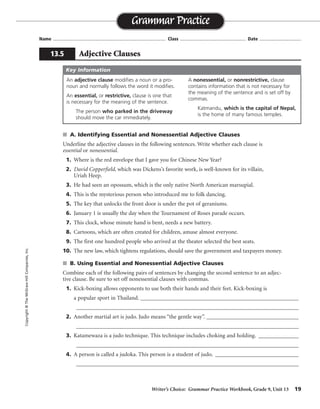
![20 Writer’s Choice: Grammar Practice Workbook, Grade 9, Unit 13
s A. Identifying Adverb Clauses
Underline the adverb clauses in the following sentences. Draw a second line under the subordi-
nating conjunction at the beginning of each adverb clause.
1. Because they had not seen each other in such a long time, their reunion was very emotional.
2. Wherever you go, I’ll follow.
3. If you have ever been to Oaxaca, you can never forget it.
4. The wedding was wonderful although it was rather costly.
s B. Distinguishing Between Adverb and Adjective Clauses
Each of the following sentences contains two dependent clauses, one adverb clause and one
adjective clause. Underline the adverb clause in each sentence.
1. After the Civil War ended, thousands of settlers who sought to build new lives traveled to
California.
2. Finally, Eleanor asked the question that had been on everyone’s mind since the debate began.
3. I admire people who can play a song by ear after they have heard the song just once.
4. As he crossed the finish line, the runner who had been favored to win felt relieved.
s C. Using Adverb Clauses
Combine each of the following pairs of sentences by changing the second sentence to an
adverb clause. Remember that an adverb clause can be placed before or after the main clause.
1. They didn’t eat a thing. The refrigerator was full of food. ________________________________
_________________________________________________________________________________
2. The game was postponed. It rained. _________________________________________________
_________________________________________________________________________________
3. Bob was the first to congratulate Susan. He heard the news. ______________________________
_________________________________________________________________________________
4. She went to the office. She accepted the new job. _______________________________________
_________________________________________________________________________________
Name ...................................................................................... Class .................................................. Date ................................
Grammar Practice
13.6 Adverb Clauses
Copyright©TheMcGraw-HillCompanies,Inc.
Adverb clauses modify verbs, adjectives, or
adverbs and are introduced by one of the fol-
lowing or similar subordinating conjunctions:
since when before
although whenever while
because after wherever
An adverb clause with some words left out is
called elliptical. The omitted words can easily
be filled in because they are implied.
I have never heard a better pianist than
she [is].
Key Information
Possible answers are given.
Although the refrigerator was full of food, they didn’t eat a thing.
Because it rained, the game was postponed.
Bob . . . Susan when he heard the news.
After she accepted the new job, she went to the office.](https://image.slidesharecdn.com/wbgrammar9-200715232228/85/MODULE-ENGLISH-9-24-320.jpg)
![S
Writer’s Choice: Grammar Practice Workbook, Grade 9, Unit 13 21
Name ...................................................................................... Class .................................................. Date ................................
s A. Identifying Noun Clauses
Underline the noun clauses in the following sentences. Write whether each is used as a sub-
ject (S), predicate nominative (PN), direct object (DO), indirect object (IO), or object of
a preposition (OP).
1. Whoever believes what Roberta said should stand by her.
2. I just cannot understand why they do not cooperate.
3. Emily said she impressed a lot of her friends with her adventure story.
4. What I would really like to know is whose car she was driving.
5. If I knew that, I think I could decide who is telling the truth.
6. They gave whoever entered their candy shop a free sample.
7. Which of the nominees will be chosen remains to be decided.
8. Our dog Poodle, a German shepherd, barks fiercely at whoever walks by our house.
9. Marti’s only consideration had been what was best for her sister.
10. This chart shows how trends have changed in the past ten years.
s B. Using Noun Clauses
Each of the following incomplete sentences contains a main clause and a relative pronoun.
In the space after each relative pronoun, use your own words to form a noun clause that
appropriately completes the sentence.
1. Most people believe that __________________________________________________________
_________________________________________________________________________________
2. He said he would go with whoever __________________________________________________
_________________________________________________________________________________
3. No one agrees that_______________________________________________________________
_________________________________________________________________________________
4. Whoever believes that ____________________________________________________________
______________________________________________________ has never had the experience.
Grammar Practice
13.7 Noun Clauses
Copyright©TheMcGraw-HillCompanies,Inc.
Noun clauses can perform any function that
nouns can perform.
Whoever can sing well may try out for
the part. [subject]
She couldn’t decide which she liked best.
[direct object]
The argument caused a misunderstanding
about when the lights should have been
turned off. [object of a preposition]
Sometimes the relative pronoun used to intro-
duce a noun clause is omitted.
I believe that the wallet belongs to you.
I believe the wallet belongs to you.
Key Information
DO
DO
DO
S PN
DODO
IO
S
OP
PN
DO
Sentences will vary.](https://image.slidesharecdn.com/wbgrammar9-200715232228/85/MODULE-ENGLISH-9-25-320.jpg)
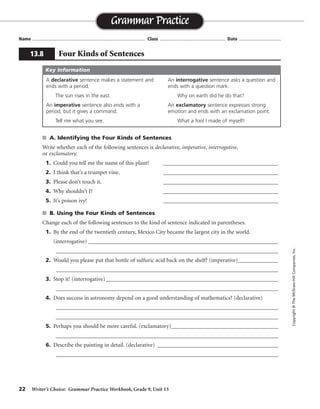
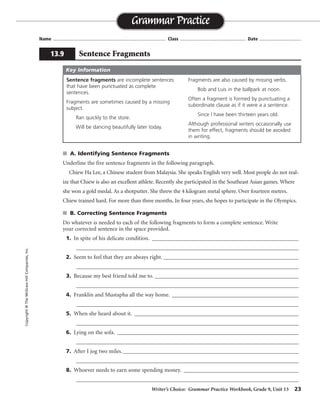
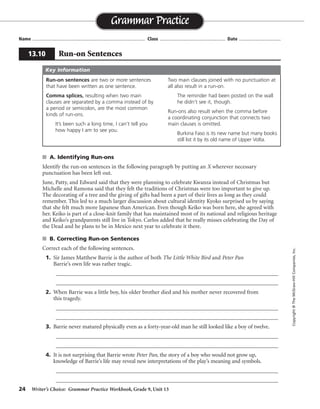
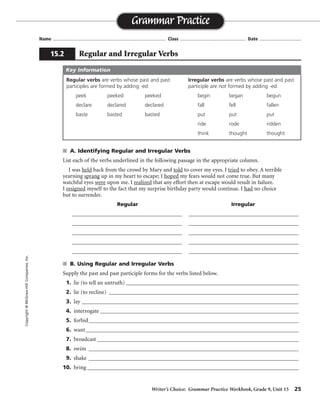
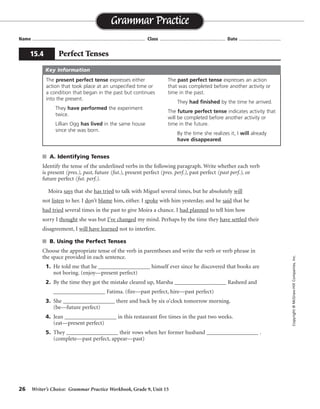
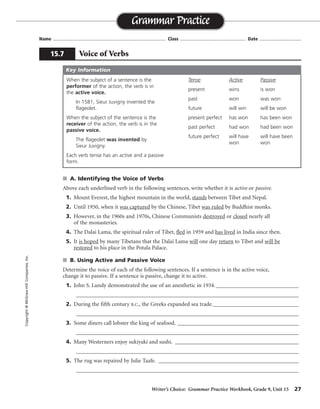
![28 Writer’s Choice: Grammar Practice Workbook, Grade 9, Unit 16
s A. Identifying Subjects and Linking Verbs
Circle the subject and underline the linking verb in each of the following sentences.
1. The first five chapters are a chilling account of what happened.
2. Ladybugs are the only type of insect she can stand.
3. The heaviest suitcase is fifteen kilograms.
4. The glass was eight ounces.
5. A sure sign of spring is daffodils.
s B. Choosing the Correct Linking Verb
Fill in the blank in each of the following sentences with the correct form of a linking verb.
1. Marvella’s birthday _______________ always fun.
2. The songs of the Beatles _______________ a good indication of the values of the sixties
and seventies.
3. Matt’s frequent headaches _______________ a subject of concern for his doctors.
4. That plate he just washed _______________ sixteen ounces of pure silver.
5. A typical litter _______________ usually four or five puppies.
6. Today’s personal computers _______________ a significant advance over those of only
five years ago.
7. A mile _______________ eight furlongs.
8. Eugenio Montale’s works _______________ a major contribution to Western literature
in this century.
9. Those tickets _______________ our only chance to see Cats.
10. The generous donation _______________ two thousand dollars.
Name ...................................................................................... Class .................................................. Date ................................
Grammar Practice
16.2 Agreement with Linking Verbs
Copyright©McGraw-HillCompanies,Inc.
Sometimes a predicate nominative is different in
number from the subject. In this situation, the
linking verb always agrees in number with the
subject, not with the predicate nominative.
The topic of the lecture was whales.
[The singular verb was agrees with the singular
subject, topic.]
Fireworks are his idea of entertainment. [The
plural verb are agrees with the plural subject,
fireworks.]
Key Information
Possible answers
are given.is
are
were
is
is
are
is
have been
were
was](https://image.slidesharecdn.com/wbgrammar9-200715232228/85/MODULE-ENGLISH-9-32-320.jpg)
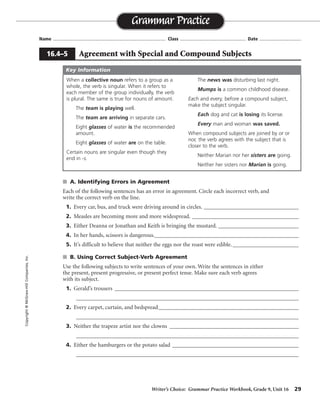
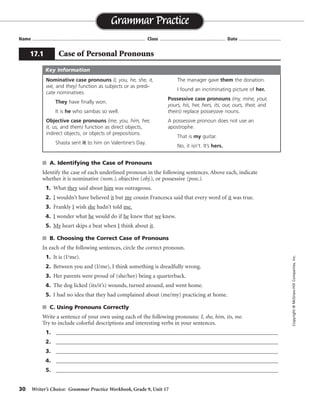
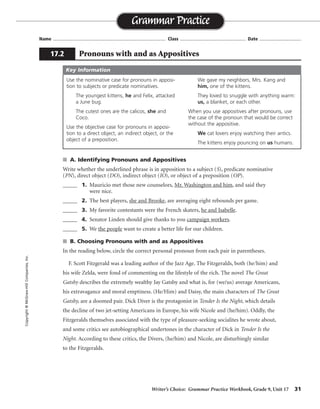
![32 Writer’s Choice: Grammar Practice Workbook, Grade 9, Unit 17
s A. Identifying Pronouns After Than and As
In the underlined part of each of the following sentences, many words are unnecessary to the
meaning of the sentence. Make an elliptical adverb clause by crossing out every word in the
clause except the pronoun. Then write above the pronoun whether it is in the nominative
or the objective case.
1. My best friend, Jonathan, has many more brothers and sisters than I have brothers
and sisters.
2. Jonathan’s father understands his brothers better than Jonathan’s father understands him.
3. My eldest sister plays football almost as well as I play football.
4. My little brother George hates broccoli as much as I hate broccoli.
5. When I tease him, my little brother George likes broccoli more than my little brother
likes me.
s B. Using Pronouns After Than and As
Complete each of the following sentences with any appropriate pronoun (except you or it) in
the nominative or objective case.
1. I am a better athlete than _________________________________________________________
2. Math was much easier for Einstein than______________________________________________
3. Neanderthal men, prehistoric humans, did not depend on their intelligence as much as
_________________________________________________________________________________
4. Diane’s minor accident scared her mother more than ___________________________________
5. Latoya doesn’t watch as much television as____________________________________________
6. Many people think John Kennedy was the youngest president ever to hold office, but
Theodore Roosevelt was actually younger than ________________________________________
7. The ballet interested my brother more than ___________________________________________
8. To my surprise, my parents liked the science fiction movie better than______________________
9. Jane Austen was not as popular during her lifetime as Sir Walter Scott, although she is
now more widely studied than _____________________________________________________
10. The bright orange paint apparently pleased our house’s former owner better than _____________
Name ...................................................................................... Class .................................................. Date ................................
Grammar Practice
17.3 Pronouns After Than and As
Copyright©McGraw-HillCompanies,Inc.
In an elliptical adverb clause, unnecessary words
may be left out. When you use a pronoun in
such clauses, choose the case that you would
use if the missing words were included.
Kenny water-skis much better than I
[water-ski].
That loud music bothers your father as
much as [it bothers] me.
Key Information
nominative
objective
nominative
nominative
objective
Possible answers are given.
he
me
we
her
I
he
her
I
he
us](https://image.slidesharecdn.com/wbgrammar9-200715232228/85/MODULE-ENGLISH-9-36-320.jpg)
![Writer’s Choice: Grammar Practice Workbook, Grade 9, Unit 17 33
Name ...................................................................................... Class .................................................. Date ................................
s Identifying Antecedents and Using Pronouns that Agree
Fill in the blanks in the following passage by Alex Haley with the pronouns them, they, he, his,
and me. Use each pronoun once. Then circle the antecedent of each pronoun you supplied.
The first native Gambian I could locate in the U.S. was named Ebou Manga, then a junior
attending Hamilton College in upstate Clinton, N.Y. __________________ and I flew to
Dakar, Senegal, then took a smaller plane to Yundum Airport, and rode a van to Gambia’s
capital, Bathurst. Ebou and his father assembled eight Gambia government officials.
I told __________________ Grandma’s stories, every detail I could remember, as
__________________ listened intently, then reacted. “ ‘Kamby Bolong’ of course is Gambia
River!” I heard. “But more clue is your forefather’s saying __________________ name was
‘Kinte.’” Then they told me something I would never even have fantasized—that in places
in the back country lived very old men, commonly called griots, who could tell centuries
of the histories of certain very old family clans. As for Kintes, they pointed out to
__________________ on a map some family villages, Kinte-Kundah, and Kinte-Kundah
Janneh-Ya, for instance.
Alex Haley, “My Furthest-Back Person—‘The African’ ”
Grammar Practice
17.5 Pronoun-Antecedent Agreement
Copyright©McGraw-HillCompanies,Inc.
Pronouns agree with their antecedents in num-
ber, gender, and person.
Pele’s extraordinary skill as a soccer player
made him world famous. [Both Pele and
him are singular, male, and third person.]
My favorite teachers try to use some fun
activities in their classes. [Teachers and their
are both plural and third person. Plural pro-
nouns are gender-neutral.]
If the gender of a singular antecedent could be
either masculine or feminine, it is traditional to
use a masculine pronoun. Other options are to
use a gender-neutral expression or to rewrite the
sentence to use a plural pronoun or no pronoun.
A person should choose his or her friends
carefully.
People should choose their friends
carefully.
People should choose friends carefully.
Avoid shifts in person.
POOR: When people drive, you should be
alert.
BETTER: When people drive, they should
be alert.
Key Information
He
them
they
his
me](https://image.slidesharecdn.com/wbgrammar9-200715232228/85/MODULE-ENGLISH-9-37-320.jpg)
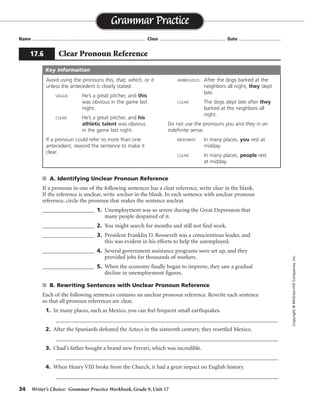
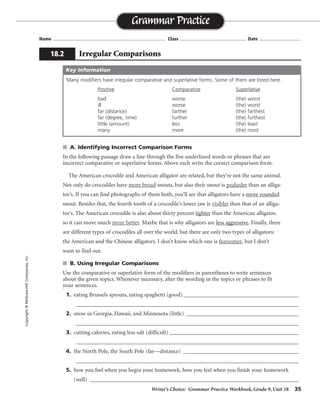
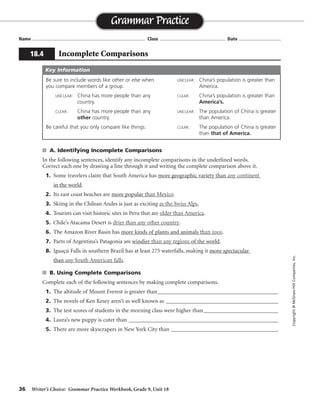
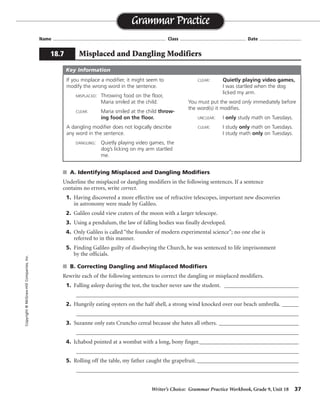
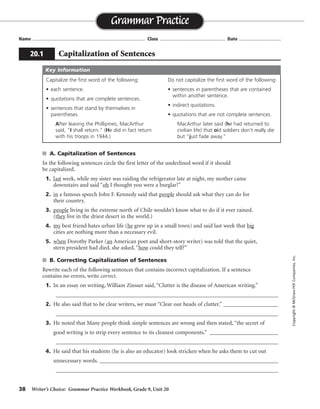
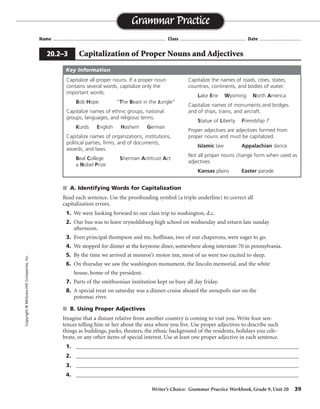
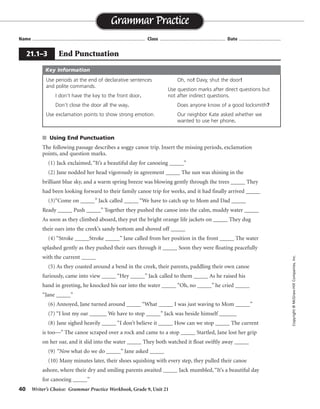
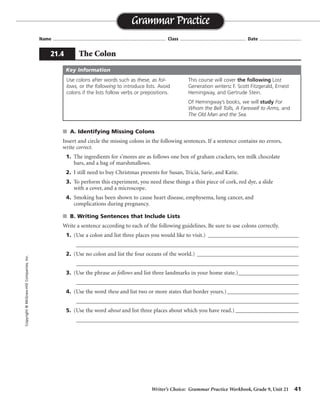
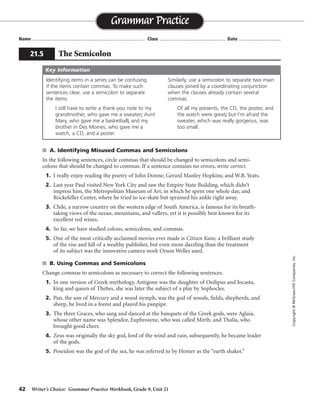
![Writer’s Choice: Grammar Practice Workbook, Grade 9, Unit 21 43
Name ...................................................................................... Class .................................................. Date ................................
s A. Identifying Coordinating Conjunctions and Missing Commas
Underline the coordinating conjunction in each of the following sentences. If a comma is
needed before a conjunction, insert and circle the comma.
1. Tala used to live in Jordan but she recently emigrated to the United States.
2. Michael turned up the radio and we danced.
3. Judy wanted to learn to play the violin and her mother enrolled her in a Suzuki course.
4. The weatherman predicted we would have sunny weather yet it snowed heavily.
5. Nelson bought a new Ferrari and a Buick hit it soon afterwards.
s B. Using Coordinating Conjunctions and Commas
Add a coordinating conjunction and another main clause to expand each of the following
sentences. Use a comma when necessary. Remember to cross out the period.
1. I’ve never been in a spaceship. ________________________________________________________
_________________________________________________________________________________
2. The oceans are becoming very polluted. ________________________________________________
_________________________________________________________________________________
3. A red sky in the morning is a sign of rainy weather. ______________________________________
_________________________________________________________________________________
4. Dogs are usually loyal to their owners. _________________________________________________
_________________________________________________________________________________
5. Violence is a serious problem. ________________________________________________________
_________________________________________________________________________________
Grammar Practice
21.6 Commas and Compound Sentences
Copyright©McGraw-HillCompanies,Inc.
Use commas between two main clauses joined
by a coordinating conjunction, unless the
clauses are very short and the meaning is clear
without them.
Mary is rather short, yet she is a great
basketball player.
Camila loves pizza but her parents hate it.
[clear]
I have seen Westminster Cathedral and
Buckingham Palace is next on my list.
[unclear]
I have seen Westminster Cathedral, and
Buckingham Palace is next on my list. [clear]
Key Information
,
,
,
,
Sentences will vary.](https://image.slidesharecdn.com/wbgrammar9-200715232228/85/MODULE-ENGLISH-9-47-320.jpg)
